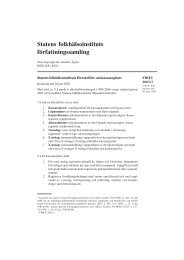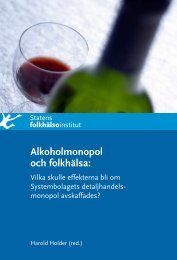Gambling Among Young People, 837 kB
Gambling Among Young People, 837 kB
Gambling Among Young People, 837 kB
You also want an ePaper? Increase the reach of your titles
YUMPU automatically turns print PDFs into web optimized ePapers that Google loves.
10<br />
Definitions<br />
what is meant by gambling games?<br />
In this review, the term “games” will only be used in the sense of gambling games, i.e. a game where<br />
you bet money and where you can win money. All other types of games are excluded, for example role<br />
play, computer games and TV games. Amusement arcade games like flipper are also not included, even<br />
if you pay to play them because the aim is not to win money. The reason for this narrow use of the term<br />
“game” is because gambling is treated as a separate phenomenon, separate from other types of games,<br />
in research and the clinical context. In literature written in English the terms gaming and gambling are<br />
used for “playing a game” (a direct translation of the Swedish term for gambling). <strong>Gambling</strong> only has<br />
to do with playing a game for money and can be associated with taking risks and with luck, while<br />
gaming might also apply to other types of games and is more associated with playing for fun. Those<br />
who manufacture, sell and organise gambling games tend to use the term gaming while those who<br />
work with pathological gambling tend to use the term gambling.<br />
children and adolescents/young people<br />
In this review, children and adolescents/young people includes everyone between the ages of 8 and<br />
20.<br />
what is meant by gambling problems and pathological gambling?<br />
Various terms are used to describe problems with gambling in literature, research and the clinical<br />
context; anything from a gambling dependency, pathological gambling, problematic gambling, and<br />
gambling addiction to taking risks. Generally, you differentiate between those who have serious gambling<br />
problems and those whose problems are not quite so serious. The terms gambling addiction and<br />
pathological gambling refer to people who fulfil the diagnosis criteria for a clinical diagnosis. The<br />
other terms indicate that only certain criteria have been fulfilled, not sufficient for a diagnosis but that<br />
the gambling still has a serious negative impact on the individual.<br />
Terms used in research<br />
Research on pathological gambling has mainly been conducted in English and the most commonly<br />
used terms are:<br />
• Pathological gambler, probable pathological gambler, serious problem gambler and problem<br />
gambler, for the more serious state.<br />
• At risk gambler, risk gambler, in transition gambler and problem gambler, for those who have less<br />
serious problems.<br />
This means that the term problem gambler may refer to both these states. This in turn means that you<br />
have to check which sense is being referred to in any literature in English.<br />
The clinical definition of pathological gambling<br />
The clinical definition of a gambling addiction that is used in the healthcare sector, in accordance<br />
with the American Psychiatric Diagnosis System DSM-IV (1), is “pathological gambling” in the<br />
English edition. However, in the Swedish translation the term “spelmani” (gambling mania) is used.<br />
According to DSM-IV the definition pathological gambling is based on the fulfilment of at least five<br />
of the following criteria:<br />
1. Preoccupied. You are preoccupied with gambling, plan your gambling, get money for gambling<br />
and so on.

















